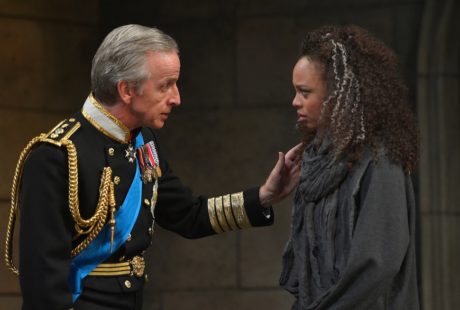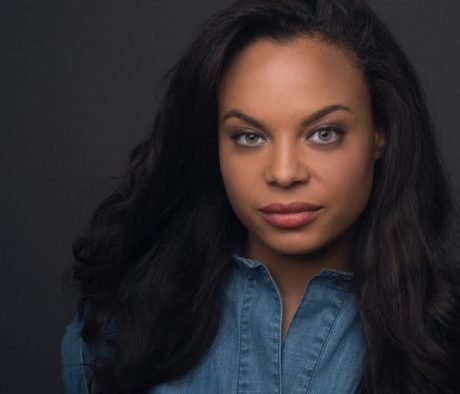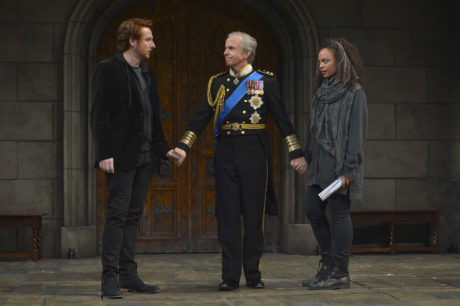I greatly admired both the writing and the acting in Shakespeare Theatre Company production of Mike Bartlett’s King Charles III, but to be honest it was the character of Jessica and Michelle Beck’s performance in it that knocked me out most of all. I remember walking out of the Sidney Harman Hall wanting to see a whole play about about Jessica, starring Michelle Beck.

I knew then I had fallen hard for her character and her performance. But until this interview, I did not fully understand why.
John: Thank you for taking this time to talk with me. First would you talk about your character? Who Jessica is, what’s her personality like, where she’s from, how she meets Prince Harry and comes into the play, and so forth?

Michelle: She’s from an upper-lower-class city just about an hour and a half outside of London. The kind of community where you don’t have a lot of money, so you have to be quick. The kind of community where you see the dismal effects of wealth disparity. The kind of community you wouldn’t let anyone speak ill of, but you also go home as little as you possibly can.
Jessica is an advocate for social justice, the kind of brave, strong, courageous young woman who is trying to effect change in a system that is antiquated to her. In this way, she’s somewhat of a depressed optimist: she knows that people are awful, but hopes they will be better.
You can’t really talk about Jess without talking about her political stance, because that’s one of her main functions in the play. While the royal family has the romanticism of tradition and the ideals of kings and queens from long ago, there’s also a large contingent of the current population in England that finds the system antiquated. They are upset about the resources that the royal family uses, and she really is the only one who gives voice to that in this play.
From your impressive acting résumé, are there roles you’ve played that you’ve connected with similar to the way you brought Jessica alive on stage? Does she remind you of anyone else you’ve played?
Michelle: Luckily, I’ve had the pleasure of playing lots of strong, interesting, young women. But Jess is different in that…well, Jess is fun. And funny. Which isn’t really something that I would characterize myself as, but has been really great to play around with, her humor.
There are moments when she reminds me of Isabella from Measure for Measure, which I had the pleasure of playing with Epic Theater Ensemble. There’s a ferocity of opinion and sense of justice where those two women intersect in my mind. We had a moment where Isabella was in the audience, screaming for justice, which I could easily see Jess doing as well. I find it fascinating that with everything that’s going on with her personal life and the photo, instead of hiding, Jess is in the middle of a protest. She doesn’t take a trip or hide out in her cousin’s basement, she’s in the thick of it. She’s brave.
Also, I played Celia in As You Like It with The Bridge Project, and just saw the lovely production over at the Folger. That reminded me of how Celia and Jess both fall in love hard from the first and also learn what trust in love looks like throughout the course of the play. Jess tries to leave Harry twice in the play! It takes him stepping up to his family, probably the only time that someone has ever defended her, and he does so beautifully. It’s the moment where we see her see him see her. And like Celia and Oliver, “they are in the very wrath of love and will together.”
Jessica seemed so real, so relatable, so recognizable. Also so smart, tough-minded, and intuitive. Like, upon her first meeting with Harry, we get the feeling she knows who Harry is far better than he knows himself. Could you talk about how you arrived at the acting choices you made to play Jessica?
Mike has really provided excellent clues for who she is. It’s such a beautifully complex play, and part of its beauty is that each character makes both relatable and questionable decisions, which really represents humanity. Finding that straddle between her strength and vulnerability was something that we kept zeroing in on during rehearsal. Like a tuning fork, it has to be just right.
Personally, I read the play over and over and over again. Also, I’ve spent quite a bit of time in England, particularly visiting smaller villages outside of London. So I looked at the people I’ve encountered from there. I researched underground and alternate movements, particularly punk. I ran into a girl in Tokyo who looked just like how Jess looked in my mind. Jess would definitely be a Harajuku girl if she lived in Japan. Subversive, bold.
What was the most important direction David Muse gave you about playing Jessica? And what was the most important conversation you had with Harry Smith, who plays Prince Harry, about the relationship between your characters?

David and I talked about making her fearless and giving her permission to say what’s on her mind, to not apologize for herself or her ideas. Like with the photo, it’s a complicated issue. It’s not so much that she’s embarrassed that she’s taken the photo, but more embarrassed that it will be on public display in a way that will be detrimental to her relationship with Harry. It’s a fine line. And where she falls on the spectrum of sexual revolution vacillates throughout the course of the play.
And Harry and I had a lot of conversations about making sure that the relationship was mutually entered into, not the byproduct of patriarchal privelege. Even discussing things like who enters/exits first, who is leading whom, and who incites physical intimacies (kissing, hand holding). All of those specifics are important in communicating the equal balance of power in their relationship.
Following Shakespearean convention, Bartlett gives King Charles III both a main plot and a subplot. Jessica and Prince Harry are in the subplot. The main plot centers on Charles, who has just become king because his mother the queen has just died. Again following Shakespearean convention, Bartlett sets up a provocative relationship between the two. Was that relationship between main plot and subplot discussed during rehearsal? Are there insights about that process that helped shape your performance?
Something we discussed in rehearsals was the parallels to other Shakespeare plays. Harry and Jess are definitely reincarnations of Hal and Falstaff. The deeply intimate relationship, the adventures they have together, and ultimate betrayal are deeply embellmatic of the Henry IV plays. You really have to play each moment for what it is and not get ahead of yourself or of the play, emotionally. Conversely, the language sits just ahead of us. There are so many examples of characters making realizations right as they speak them.

There’s something really fascinating going on in the play thematically. In the main plot Charles declares he will not sign a privacy bill that would, in his view, fetter the press. The bill has already been passed and merely awaits his ceremonial signoff, but he refuses, and brouhaha ensues. Meanwhile in the subplot, just as Jessica’s affair with Harry starts getting press notoriety, Jessica learns her privacy has been invaded because an ex (whom she calls a dick) is threatening to send to a London tabloid an intimate selfie she sexted him. Technically this is blackmail but realistically Jessica is without resources to protect herself. So in a brilliant stroke of plot/counter-plotting, we see Charles in the main story as a champion of press freedom (he’d be an ACLU poster person in the States), and in the secondary story we see Jessica as a victim of press freedom. Typically the debate over freedom of the press does not take into account the fact that full-on freedom of expression can on occasion cause unredressable human harm. Nor is that the debate in King Charles III; there the argument in the main plot is solely about the power and prerogative of the monarchy. But embedded structurally in the play—in the thematic interplay between main plot and sublot, and especially in the amazing character of Jessica—is a kind of subversive exposé of the hazards of free-speech purism. I’m curious to know your thoughts on all that, and what’s going through your mind while you’re playing Jessica when this all comes down.
One of the great ironies of the play is when Jess says, “The law was changed for this.” The bill that Charles fought so hard against ends up being superfluous, and the press still prints every lewd photo of Jess that they can find. She struggles in the dichotomy between the theory of law and personal protection. It’s fascinating to me that although Jess originally approaches Reiss [the press secretary to the royal family] for protection, by the time Harry and Jess approach Charles with the plan, that isn’t their request. She knows that she has to fall on her proverbial sword. King Charles offers his protection and fails to come through. And, of course, Harry’s betrayal is utterly heart-breaking. She is a casualty. Really one of the tragedies of the play is that Jess gets treated like Diana by being hounded relentlessly by the press and abandoned by the royal family.
Running Time: Two hours and 40 minutes, with one 15-minute intermission
King Charles III plays through March 18, 2017, at Shakespeare Theatre Company’s Sidney Harman Hall – 610 F Street, NW, in Washington, DC. For tickets, call the box office at (202) 547-1122, or purchase them online.
https://www.youtube.com/watch?v=uGkiYakOdzI
LINKS:
King Charles III at Shakespeare Theatre Company reviewed by by Sophia Howes.
Spine: King Charles III at The Shakespeare Theatre Company by Robert Michael Oliver.
In the Moment: ‘King Charles III’ at Shakespeare Theatre Company by David Siegel.





